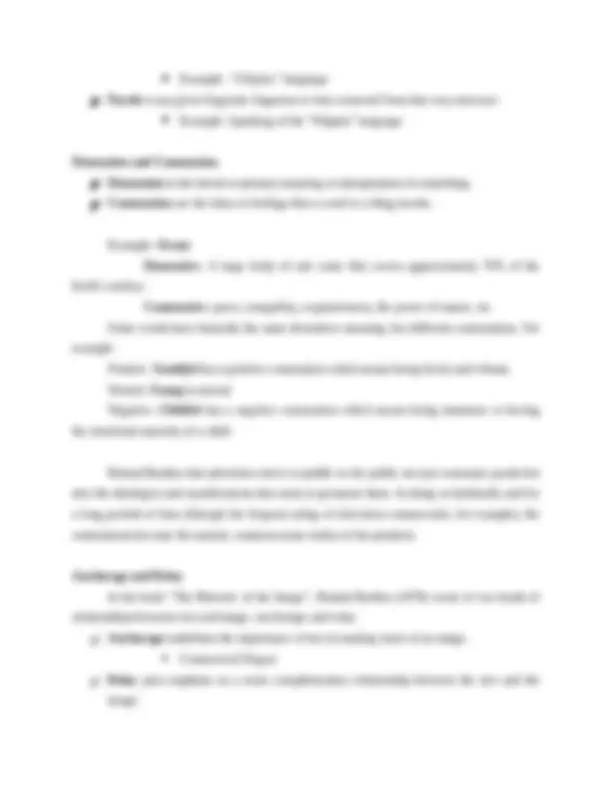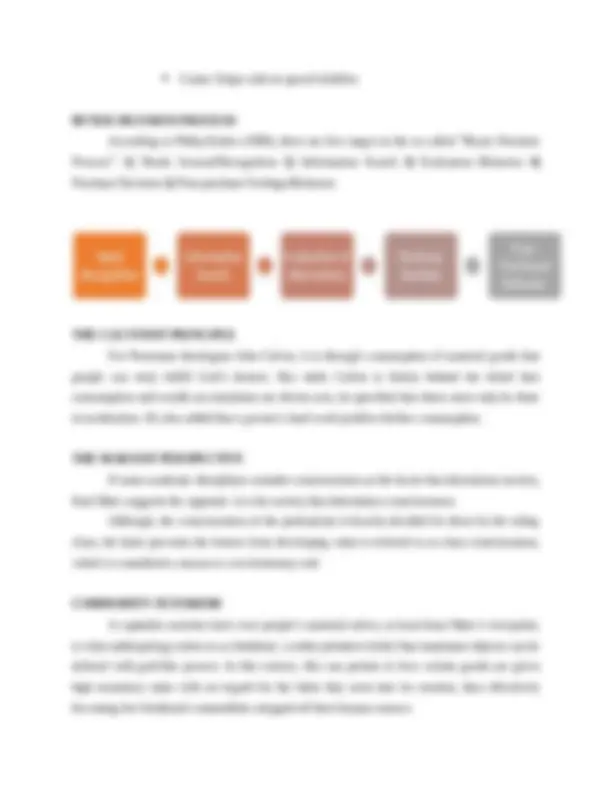





Study with the several resources on Docsity

Earn points by helping other students or get them with a premium plan


Prepare for your exams
Study with the several resources on Docsity

Earn points to download
Earn points by helping other students or get them with a premium plan
Community
Ask the community for help and clear up your study doubts
Discover the best universities in your country according to Docsity users
Free resources
Download our free guides on studying techniques, anxiety management strategies, and thesis advice from Docsity tutors
It is a guide to help the students cope up with this unending crisis the world is facing right now.
Typology: Summaries
1 / 6

This page cannot be seen from the preview
Don't miss anything!




“I was absolute master of my old dressing gown, but I have become a slave to my new one.”
- Denis Diderot The Diderot Effect is one of the most commonly-experienced phenomena of consumption which means that one innocent purchase can unexpectedly spiral into an endless cycle of complementary consumption: the kind which preys on one’s yearning for a cohesive identity. THE MATERIAL SELF: LIVING IN A MATERIAL WORLD “In its widest possible sense, a man’s self is the sum total of all that he can call his.” - William James The Principle of Psychology William James (1890)
The Spiritual Self
For 19th^ century French philosopher William James (1842-1910), an individual’s selfhood can be broken down into several fragments, with the material self being one. THE MATERIAL SELF HIERARCHY In the face of material loss, we experience “the sense of shrinkage of our personality, a partial conversion of ourselves into nothingness” , according to William James. This is why we “die a little” every time we lose some of our possessions. CONSUMER CULTURE AND THE SELF “Necessity is the mother of consumption.” BODY CLOTHING FAMILY HOUSE OTHER PROPERTIES
Example: “Filipino” language Parole is any given linguistic fragment or item extracted from that very structure. Example: Speaking of the “Filipino” language Denotation and Connotation Denotation is the literal or primary meaning or interpretation of something. Connotation are the ideas or feelings that a word or a thing invoke. Example: Ocean Denotative : A large body of salt water that covers approximately 70% of the Earth’s surface. Connotative : peace, tranquility, expansiveness, the power of nature, etc. Some words have basically the same denotative meaning, but different connotations. For example: Positive: Youthful has a positive connotation which means being lively and vibrant. Neutral: Young is neutral. Negative: Childish has a negative connotation which means being immature or having the emotional maturity of a child. Roland Barthes that advertises strive to peddle to the public not just consumer goods but also the ideologies and mystifications that seem to permeate them. In doing so habitually and for a long periods of time (through the frequent airing of television commercials, for example), the connotations become the natural, common-sense reality of the products. Anchorage and Relay In his book “The Rhetoric of the Image”, Roland Barthes (1978) wrote of two kinds of relationships between text and image: anchorage and relay. Anchorage underlines the importance of text in making sense of an image. Commercial Slogan Relay puts emphasis on a more complementary relationship between the text and the image.
Comic Strips with its speech bubbles BUYER DECISION PROCESS According to Philip Kotler (1980), there are five stages in the so called “Buyer Decision Process”: 1) Needs Arousal/Recognition 2) Information Search 3) Evaluation Behavior 4) Purchase Decision 5) Post-purchase Feelings/Behavior. THE CALVINIST PRINCIPLE For Protestant theologian John Calvin, it is through consumption of material goods that people can truly fulfill God’s desires. But while Calvin is firmly behind the belief that consumption and wealth accumulation are divine acts, he specified that these must only be done in moderation. He also added that a person’s hard work justifies his/her consumption. THE MARXIST PERSPECTIVE If some academic disciplines consider consciousness as the factor that determines society, Karl Marx suggests the opposite: it is the society that determines consciousness. Although, the consciousness of the proletariats is heavily decided for them by the ruling class, the latter prevents the former from developing what is referred to as class consciousness, which is considered a means to a revolutionary end. COMMODITY FETISHISM A capitalist societies have over people’s material selves, at least from Marx’s viewpoint, is what anthropology refers to as fetishism: a rather primitive belief that inanimate objects can be imbued with god-like powers. In this context, this can pertain to how certain goods are given high monetary value with no regard for the labor that went into its creation, thus effectively becoming but fetishized commodities stripped off their human essence. Need Recognition Information Search Evaluation of Alternatives Purchase Decision Post- Purchased Behavior